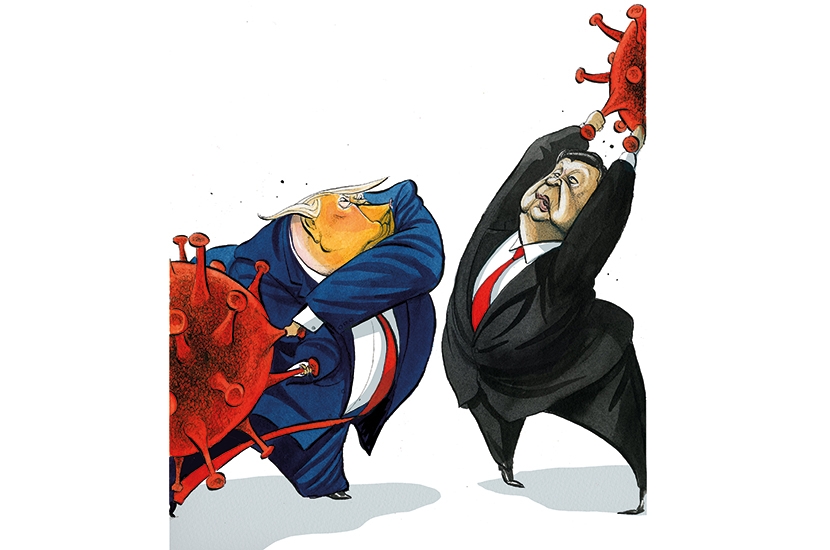Anyone who has worked in an office has fantasized about destroying it. As someone who has taken a sledgehammer to his office and fire to his papers — leaving the UK’s Libyan embassy in 2011 — I experienced a twinge of nostalgia on seeing Chinese diplomats burning papers after being given 72 hours to leave their consulate in Houston in July. The inevitable tit for diplomatic tat came, and American officials were sent packing from their consulate in Chengdu. Since then, relations between the US and China have deteriorated further, with Donald Trump pledging this week to ban the Chinese video app TikTok for national security reasons.
This breakdown in relations looks like the confluence of two currents in US politics: electoral politics combining with an ideological hostility to China within the White House, which aims to stop China’s rise. But there are many other reasons for the US to have a wider rethink about its relationship with China, of which the consulate closure in Houston and the potential TikTok ban are but the latest symptoms.
The ongoing reset of relations between the US and China will outlast the presidential election, whoever wins. Both Democrats and Republicans no longer believe that China will become ‘more like us’ as they did in the 2000s when China joined the WTO. The same realization is happening in other liberal democracies, even if the Americans are more gung-ho than Europeans or antipodeans in severing relations with China.
Beijing’s behavior is now seen as a threat to America’s security and values. China’s territorial expansion in the South China Sea, its intention to forcefully absorb Taiwan, and its recent skirmishes with India suggests that is becoming a military menace. The Chinese Communist party’s (CCP) treatment of Xinjiang’s Uighurs, of Hong Kong, and of human rights defenders has simultaneously revealed its values, and as a result the US is intent on restricting China’s governance and surveillance systems as part of a containment strategy.
Systems, whether economic, political or values-based, are diverging more generally between the East and West — a trend accelerated by emerging technologies and by the erosion of the difference between their civil and military uses. This divergence is not just an American initiative. Xi Jinping is adamant about a different internet model, which emphasizes sovereignty over universality. It is also worth remembering how he sees relations: in his first, scene-setting speech to the politburo in 2013 he talked of Chinese socialism gaining the ‘dominant position’ over western capitalism.
Meanwhile, in addition to relentless cyber-attacks, the US is experiencing a wave — or tsunami — of espionage cases. The FBI has announced that of its 2,000 active intelligence investigations, 80 percent relate to China. While Houston consulate officials are unlikely to have run agents given the likelihood of close FBI monitoring, they were probably active in talent-spotting and facilitating intelligence operations.
This is closely related to concerns about the theft of intellectual property and Chinese military personnel attending US universities while concealing their provenance, as they research subjects which might help Chinese weapons programs. Commercial espionage and the recruiting of US scientists to work part-time on Chinese programs has equally exasperated the Americans.
America (and Europe) is also losing patience with Chinese promises to reform their business environment, which is currently stacked against foreign companies. Particular gripes include the lack of market access for US firms, unfair procurement practices, Chinese state subsidies, and a welter of non-tariff barriers.
Angered at the restrictions its own diplomats face in China (for example, from visiting Tibet), the US has cut back on the freedom of movement of the remaining Chinese diplomats in America. The US has designated five Chinese media organizations as foreign missions and capped the number of their national employees at 100 — a response to the difficulties American media faces in China.
[special_offer]
And so the closure of the Houston consulate aimed to send a message. As a Justice Department official said: ‘Unless we disrupted it, it threatened to become even more aggressive in Houston and in other Chinese consulates nationwide.’ Unsurprisingly, the CCP closed an American consulate to send back the message that it would not be intimidated.
While President Trump’s bipolar foreign policy and the dragging of China into the elections have worsened relations, things are unlikely to return to the old normal when we see a new or renewed presidency. The Chinese leopard will not change its spots and the US will remain concerned about a growing security threat in the Pacific, threats to its version of global governance, the incompatibility and inequity of their economic systems, and China’s assault on universal values. A potential flashpoint is Taiwan.
To call this a second Cold War is wrong. It is indeed a struggle, as Xi himself describes it internally (he is no huggable panda). But China is not the Soviet Union, which the West could and did isolate. We cannot ignore China’s economy which is interwoven with ours; we should cooperate in many non-sensitive scientific and technological areas; and together we must work on climate, health, development and other global goods.
This article was originally published onThe Spectator’s UK website.


















